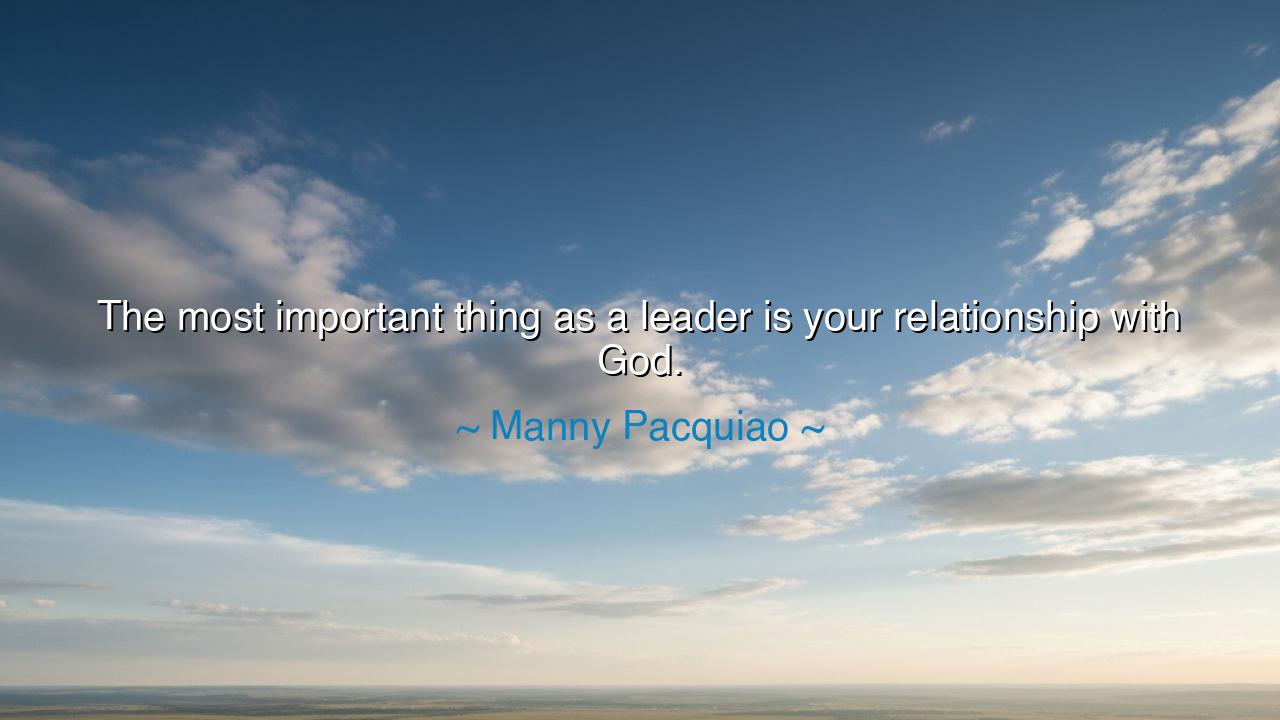
The most important thing as a leader is your relationship with






The champion Manny Pacquiao, both warrior in the ring and servant of the spirit, once declared: “The most important thing as a leader is your relationship with God.” In this proclamation lies the ancient truth that all power without divine guidance is but dust in the wind. For kings rise and empires fall, but only the leader who bends first to the Eternal stands firm when storms rage. Thus he teaches that leadership begins not in command of men, but in humility before God.
The ancients knew this wisdom well. They built temples before thrones, and altars before armies, for they understood that without the blessing of the heavens, mortal strength falters. To possess a relationship with God is to anchor the heart in righteousness, to draw wisdom not from pride but from the wellspring of truth eternal. Such a leader does not rule by fear or vanity, but by light that guides both self and people.
For what is a leader if not a shepherd? And how can a shepherd guide the flock if he himself is blind to the path? It is in prayer, in surrender, and in communion with the divine that the leader’s eyes are opened. From this bond flows courage in the face of enemies, patience in the face of hardship, and mercy in the face of betrayal. To walk with God is to lead with more than human strength—it is to lead with eternal purpose.
Yet the call is not to leaders alone. Every man and woman who shoulders responsibility, whether over a family, a people, or even their own destiny, must learn this truth: authority without God becomes tyranny, and ambition without God becomes ruin. Only when the soul is aligned with the divine does power become service, and command become blessing.
Let the generations remember: crowns tarnish, titles fade, victories are forgotten, but the leader who anchors himself in his relationship with God leaves behind a light that no darkness can extinguish. This is the wisdom of the ages, the path of the righteous, and the foundation upon which true leadership must forever stand.






NNnhi nguyen
This quote by Pacquiao really highlights how personal beliefs shape leadership styles. For him, a connection to God provides the foundation for his leadership, but does that mean leadership can’t be just as effective without religion? How do leaders in different parts of the world, with various beliefs, approach the challenges of leadership? Can someone lead with the same strength and integrity without relying on faith as a source of guidance?
TT38.Tran Thien Tam
Pacquiao’s quote makes me think about the deeper motivations behind leadership. It’s clear that faith can be a powerful guiding force, but is it possible for leaders to rely too heavily on it? Could focusing too much on spiritual guidance risk overlooking practical solutions or critical thinking? On the other hand, can strong faith lead to better moral decision-making? It’s fascinating how different types of leadership are shaped by one’s personal beliefs.
DHDao Hai
It’s interesting that Pacquiao places such importance on his relationship with God in leadership. For some, this might resonate deeply, while for others, it may seem disconnected from more secular leadership qualities. How do leaders who don’t subscribe to any particular faith approach their leadership? Is a spiritual foundation necessary to be truly effective, or can secular leaders still embody values like integrity, compassion, and vision without faith?
QNNguyen Quynh Nhu
Pacquiao’s view is certainly impactful, especially in a world where many leaders focus solely on power, status, or authority. It raises the question—how much does spirituality play a role in effective leadership? Can faith truly be the foundation for making wise, ethical decisions, or does it sometimes limit the approach to complex leadership situations? How do leaders balance faith with the demands of their roles in a diverse world?
DHLam Diem Hang
I find it powerful that Pacquiao attributes his leadership to his relationship with God. It’s clear that for him, faith is at the core of his success. But is this true for all leaders, or do leadership qualities also come from experience, intellect, and empathy? I wonder—how does a leader’s faith shape their decision-making and how they handle challenges? Is it possible for someone to be a great leader without that kind of faith-driven foundation?